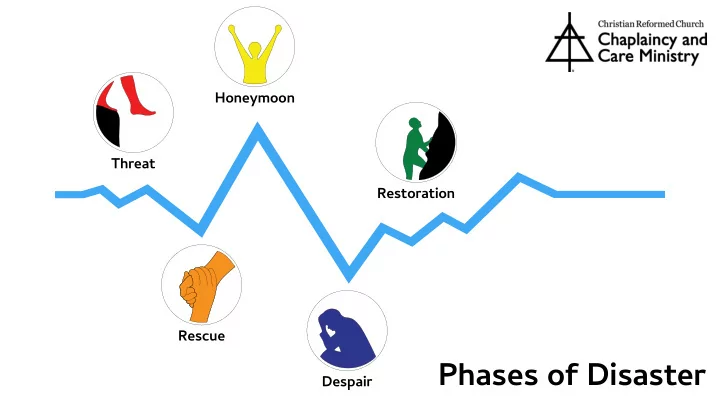

Honeymoon Threat Restoration Rescue Phases of Disaster Despair
Threat Threat Phase: Small events serve as a warning or threat to “normal” living. A disaster has not yet oc- curred, but there is a sense of impending doom. Individual reactions range from feeling completely invul- nerable to highly anxious and afraid. Phases of Disaster Feelings: invincibility, denial, vulnerability, fear, uncertainty
Rescue Phase: The disaster event occurs, bringing with it a disruption of “normal” life. Individuals and communities lose the equilibrium of body, soul, and spirit. Disbelief leads to questions like Why me? Why us? Why didn’t God hear our prayers? Stories of selfmess acts emerge, which provide hope. Feelings: shock, disbelief, disorientation, heroism, selfmessness Rescue Phases of Disaster
Honeymoon Honeymoon Phase: Shortly after the disaster, people experience a huge adrenaline rush. Communities adopt a “we shall overcome” mentality, and rally to help through donations and volunteering. The disaster has changed the world, and people renew their dedication to living better. Phases of Disaster Feelings: generosity, optimism, gratitude, idealism
Despair Phase: As the high from the honeymoon phase fades, people begin to understand the extent of their losses. This leads to a sharp emotional plunge into depression, abandonment, and fear. Recovery feels impossible, made worse by feelings of loneliness and frustration. Feelings: abandonment, fear, loneliness, anger, distrust, grief, disillusionment Phases of Disaster Despair
Restoration Restoration Phase: People return step-by-step to their foundational strengths. Over time there is a growing recognition of wisdom learned and renewed reliance on loving community. While there are brief returns to the despair phase, eventually individuals and communities achieve a state of healing and emo- Phases of Disaster tional stability. Feelings: love, shalom, community, acceptance, meaning
Recommend
More recommend